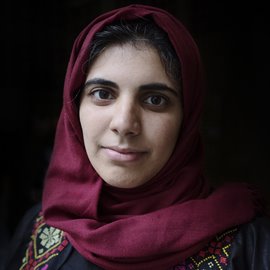07 November, 2016
Original caption from World Press Photo (2018)
Veronica (28) massages the breasts of her daughter Michelle (10) while her other children watch, in East Cameroon.
As part of a review of our online archive, some images have limited access to protect the privacy of the individuals photographed. This image is only available on request for research purposes. Please request access by emailing our team. Read more about our work on our online archive.
More information
Through a Glass Darkly, by Robert Godden, published on Witness in September 2017
How should vulnerable children be represented in the media? Are we guilty of applying different ethical standards dependent on the race, ethnicity, nationality, location, gender or class of the child? Robert Godden explores these questions and provides guidelines for photojournalists and organizations.
Breast ironing is a traditional practice in Cameroon that involves massaging or pressing the breasts of pubescent girls in order to suppress or reverse breast development. The practice is carried out in the belief that it will delay maturity and help prevent rapes or sexual advances. Breast ironing is usually done by the girl’s mother or an older relative. Techniques differ from region to region. Some people bind the breasts with a belt, others heat a grinding stone, spatula or pestle and use it to press or massage the breasts.
Although largely a Cameroonian practice, breast ironing does occur in some other countries across West and Central Africa. Local NGOs estimate that around 25 percent of women in the Cameroon have undergone some form of breast flattening; in some areas that rises to over 50 percent. Mothers explain that the painful procedure is an act of love, to make sure their daughters don’t get pregnant and miss out on school or jobs. There is little medical research on the psychological and physical consequences of breast flattening, but according to the United Nations Population Fund, the practice exposes girls to numerous health problems deriving from tissue damage and infection.

Heba Khamis
Heba Khamis (b.1988) is an Egyptian independent visual researcher, educator, and practitioner whose work explores the ethics and emotional impact of documenting sensitive social ...